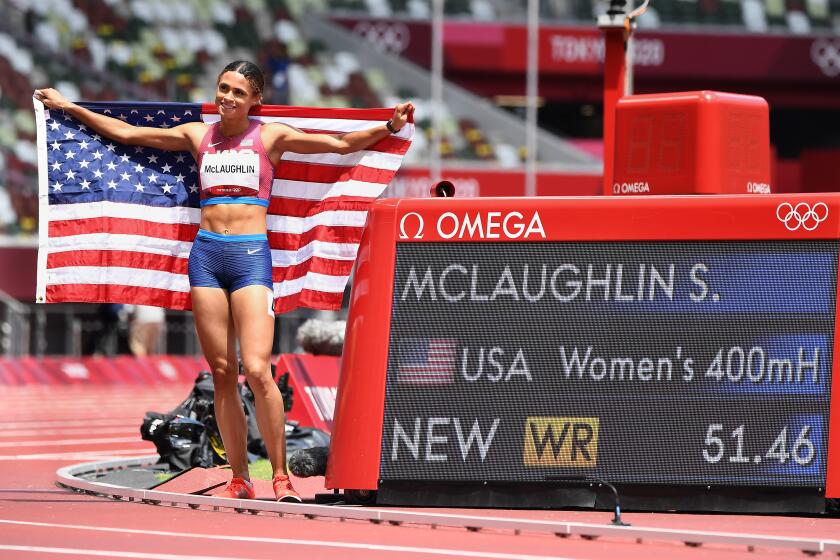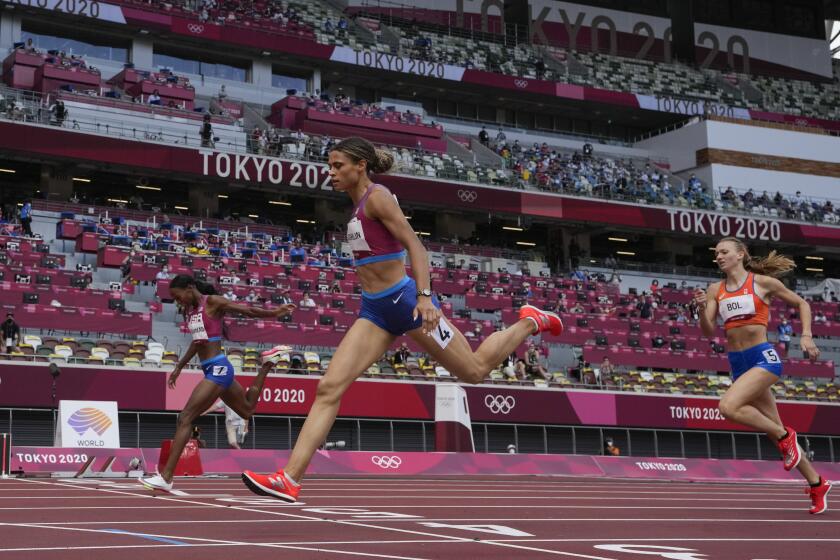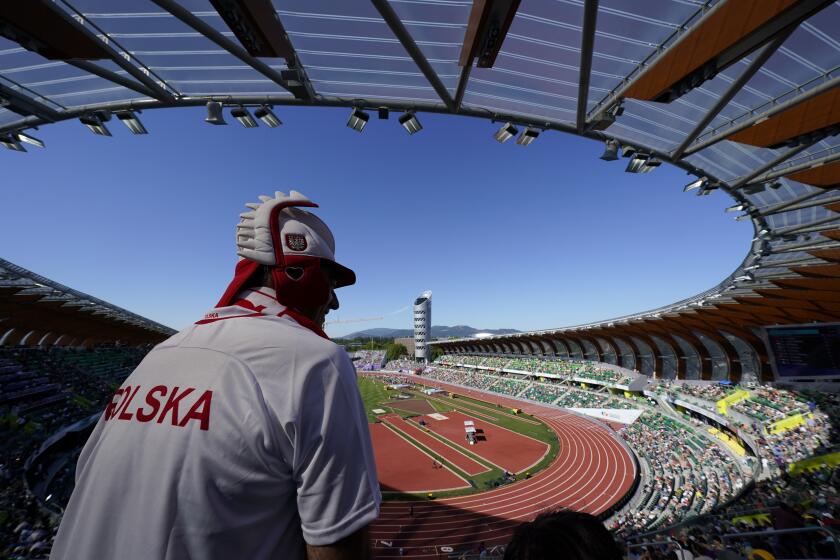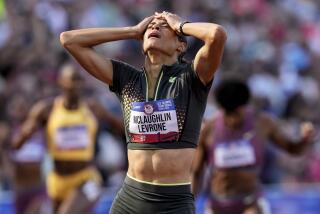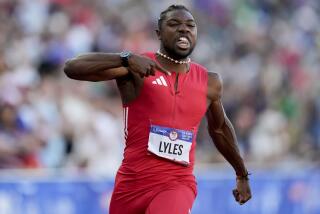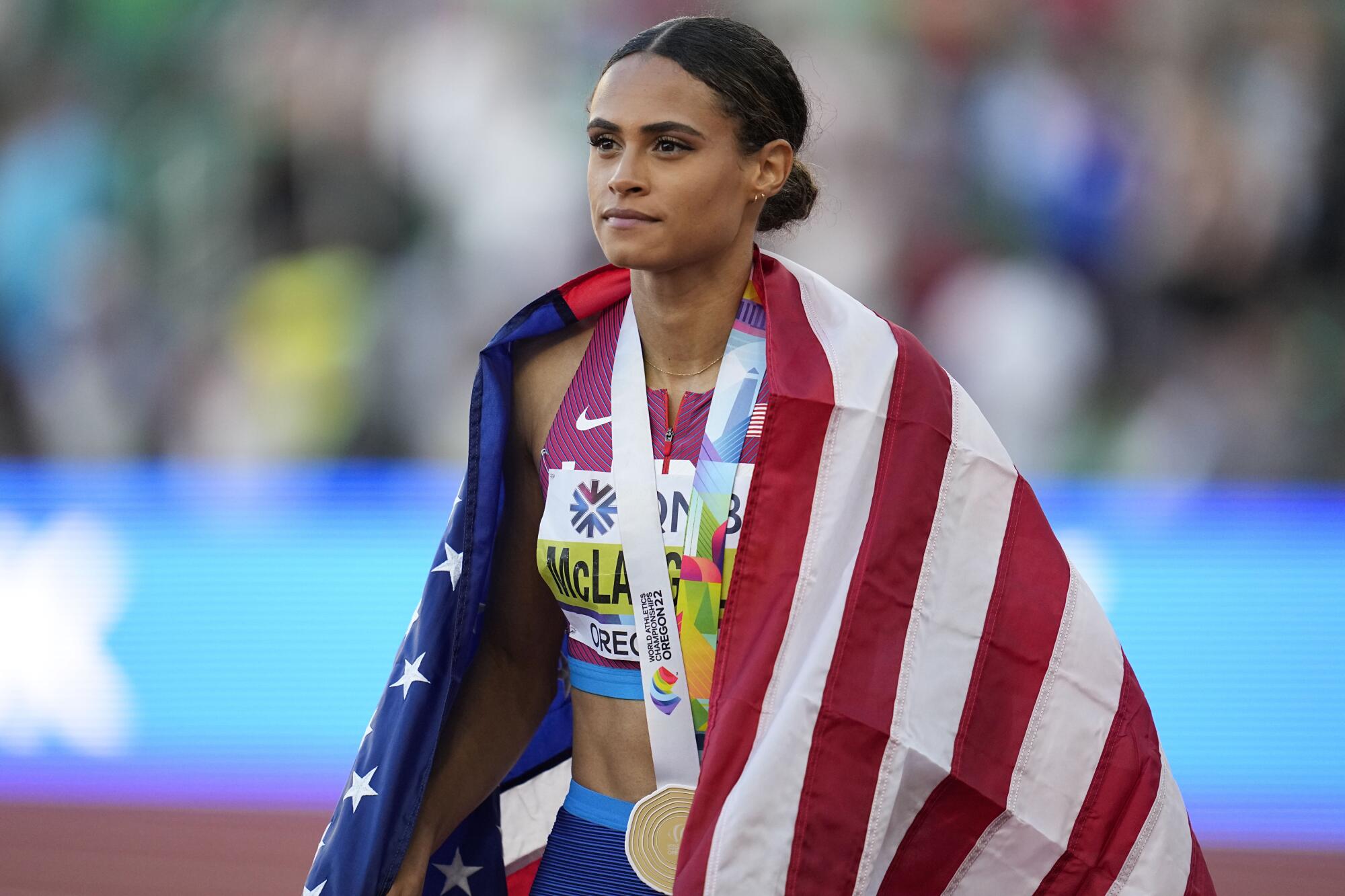
- Share via
In July, Sydney McLaughlin-Levrone emerged as one of track and field’s most dominant and recognizable stars.
She also, without a doubt, is its least-known poet.
McLaughlin-Levrone began writing her story without realizing it at age 6 when, enticed by her parents’ reward of a chocolate bar if she won, she finished first in a local 100 meters race near their New Jersey home. This became a pattern. Despite training on a triangle-shaped high school track, she became an Olympian at 16 and owned the national prep record.
In 2018, she smashed the collegiate record as a Kentucky freshman and later won the NCAA title, on a rain-soaked track, with such ease that Kevin Young, the 1992 Olympic gold medalist in the event, and whose world record stood for 29 years, thought to himself, “Whoa, this comet’s on its way.”
As her fame grew, so did McLaughlin-Levrone’s reticence to share her thoughts outside of a small circle of family and friends. She would race, and so would her mind, and so she opened her laptop, or her phone’s Notes app, and typed what she was feeling. Rereading her words, sometimes weeks later, helped her feel she could better understand herself.
“There’s so much whether it’s through social media or just everyday life where it’s bottled up,” she said in an interview. “I love poetry just being able to kind of just relieve all of that.
“Sometimes I’ll write to 6-year-old me who has dreams and aspirations to be where she is right now. Sometimes it’s about my faith, my relationship with my husband or even just track in general.”
Sydney McLaughlin wins gold for the U.S. in the women’s 400-meter hurdles at the Tokyo Olympics. U.S. teammate Dalilah Muhammad is second.
At 23, McLaughlin-Levrone is better known for authoring what is already one of track and field’s most impressive résumés: Olympic and world championship gold medals in the 400-meter hurdles, the event whose world record she has reset four times in the past 13 months, including her latest-record breaking run in July’s world championships in Oregon, where her 50.68 clocking made her the first woman to dip underneath the punishing event’s once-unconquerable 51-second barrier.
What is most intriguing within track and field is that for as much as she has achieved her future, by her own acknowledgment, remains a blank page. She is mulling whether to continue running the 400 hurdles, double up with a second race or move on from her signature event and focus on another while attempting to replicate her dominance.
“There’s still more that we want to accomplish in the 400 hurdles and that would be what we tend to do this next season,” said McLaughlin-Levrone, who has trained in Los Angeles since 2018. “And if we decide possibly to branch out then that will be a discussion. But I think in terms of the future, there are definitely other events that I would love to try to do, whether it be the 400 or the 200 or the 100 hurdles.”
“I love the idea,” she added, “of being able to step out and do other events and kind of just show the range and have some fun doing things I don’t normally get to do.”
Her favorite moment in the 400 hurdles comes between the seventh and eighth hurdles, when the top of the final curve gives way to the sight of the final straightaway. She “wakes up” there, 300 meters in, from her blindered focus on her stride pattern and takes stock of where she, and her challengers, stand. This month, as her 2022 season ended and a weight lifted after checking off her career’s two primary goals — Olympic and world championships gold medals — McLaughlin-Levrone finds herself in a similarly transitional phase.
And so she has begun taking stock of who and where she is and what lies ahead.
The changes begin with her name. Married in May to Andre Levrone, a former NFL receiver, she now prefers to be known by her hyphenated last name, she said. There is also her increased comfort embracing global fame as past reservations about sharing her life off the track begin to ease. Above it all is the question of what she will run.
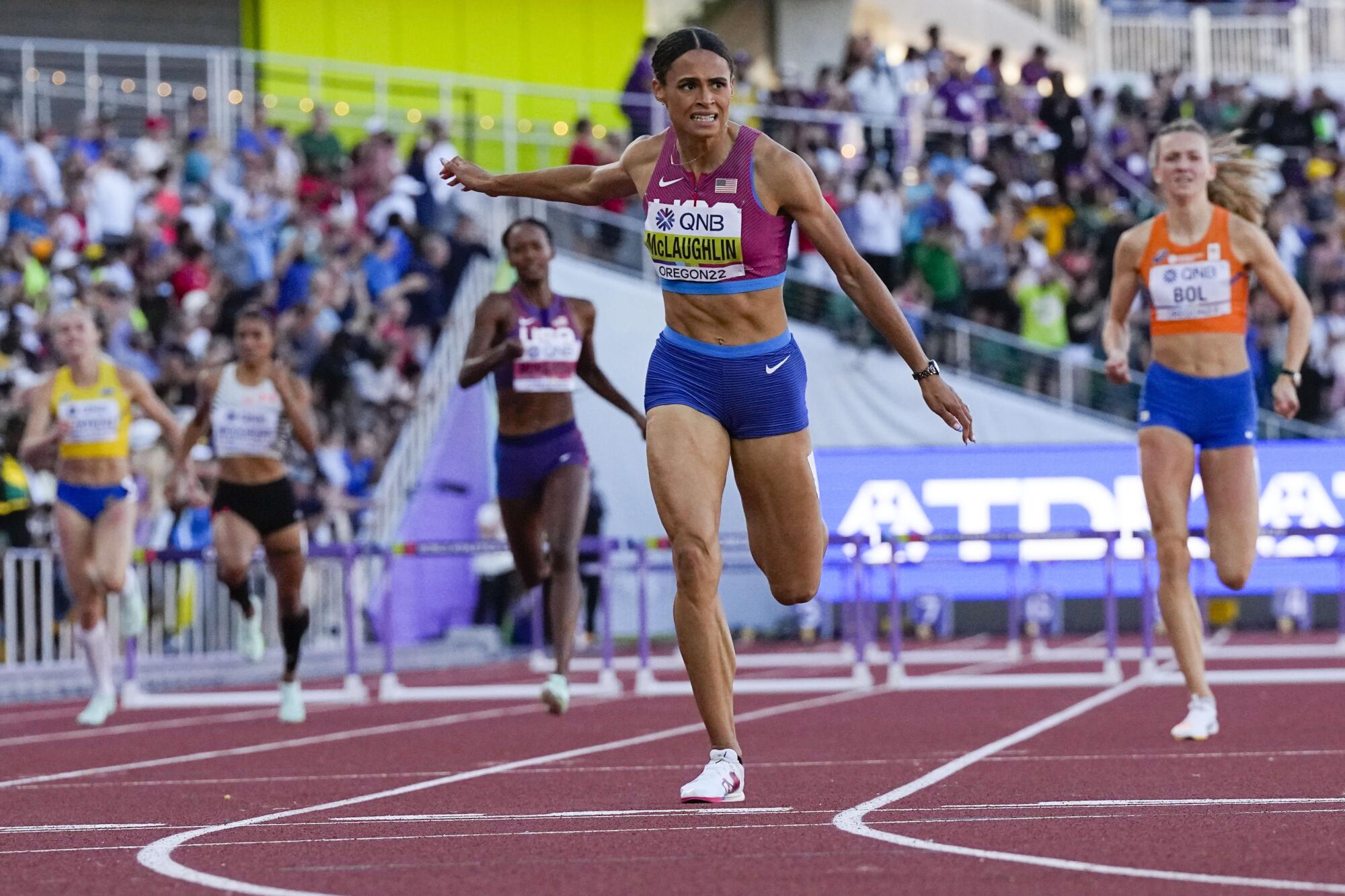
“I love the idea of being able to step out and do other events and kind of just show the range and have some fun doing things I don’t normally get to do.”
— Sydney McLaughlin-Levrone
“The biggest thing now is what is Sydney going to do next?” Young said. “Because we’re always looking for a challenge and she has superseded anything and everything we were expecting her to do.”
By mid-August, her season over, she prepared for a photo shoot for her sponsor, New Balance, and a September honeymoon. She had not yet had The Discussion with her coach of two years, Bobby Kersee. But she has certainly thought about her career’s next chapter.
“What motivates me now is just finding things that people, and myself included mainly, [believe are] kind of far-fetched or out of reach or impossible,” McLaughlin-Levrone said. “And kind of just working toward proving that they’re not, whether that’s running sub-51 seconds, or trying to double in an event, or switch to a completely different event. Looking for different things that maybe the sport hasn’t seen.”
With McLaughlin the first woman to run under 51 seconds, and Norway’s Karsten Warholm the first man to dip under 46 last year, not since Edwin Moses won 122 consecutive races between 1977 and 1987 has this level of attention been focused on the 400 hurdles, an event its competitors liken to solving a puzzle at full speed.
Ralph Lindeman, a longtime college coach, once called the race “arguably the most demanding of all events in the sprint-hurdle group,” an appraisal he based on not only the event’s requirement of speed, endurance and technical hurdling skill but also a constant awareness of stride pattern between the 10 hurdles that can lead to mid-race — and sometimes mid-air — adjustments.
Moses theorizes the race presents, at a minimum, 31 moments for failure: the start, followed by the takeoff, flight and landing at each hurdle. Using his background in math and degree in physics, he won Olympic gold medals in 1976 and 1984 by rigorously thinking his way around such mistakes, pioneering the use of only 13 strides to cover the 35 meters between hurdles. Young became the first to break the 47-second barrier in 1992 by using only 12 strides between the fourth and fifth hurdles, a tactic he calculated created an eight-meter cushion on his competitors.
Since switching to Kersee’s coaching in 2020, McLaughlin-Levrone has also separated herself by using 14 strides between hurdles, a rarity among women. Through a technical consistency and a top-end speed Moses likened to a car’s sixth gear, she has run six of history’s seven fastest times.
“Her only limitation is the amount of errors she makes that day,” said Moses, who has never spoken with her but has followed her career closely.
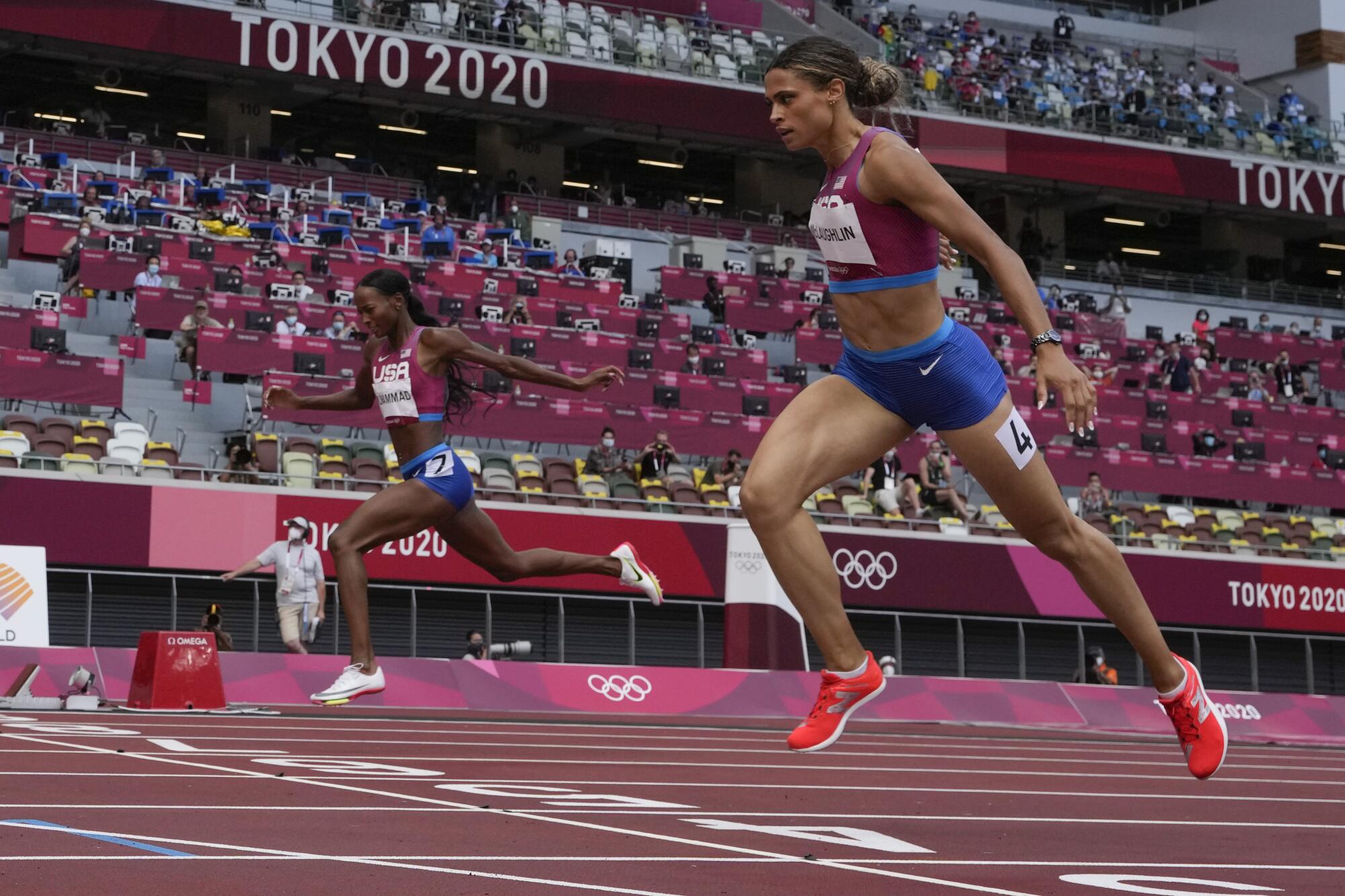
“What motivates me now is just finding things that people, and myself included mainly, [believe are] kind of far-fetched or out of reach or impossible.”
— Sydney McLaughlin-Levrone
After McLaughlin-Levrone lowered her world record in July to 50.68 seconds — a drop of a staggering 0.73 of a second, and a time that would have beaten two women in the final of the world championships’ open 400, the race without 10 hurdles — former world record-holder Dalilah Muhammad said a 49-second race was now within reach.
“For Sydney,” she said, smiling.
“I do think 49 is possible,” McLaughlin-Levrone said. “It’s just about who’s going to, number one, be able to train for that place and, number two, put that race together.”
Yet for all that technique and strategy dictate 400 hurdles success, and despite the ways faster tracks and technologically advanced spikes have pushed times forward, “so much of it is in the mind,” Moses said. And last month, as he watched McLaughlin-Levrone walk outside Hayward Field to her world championships semifinal in Eugene, Ore., in her expression he glanced a “tunnel vision” and mental toughness that reminded him of his own.
“When I ran races I was fearless. I knew that I was going to die, I knew I was going to win and I knew I was going to hurt the most,” Moses said. “… I wasn’t afraid to approach the race in that way and I think Bobby got [McLaughlin-Levrone] to the point where that’s exactly what she’s doing.”
The world championships begin with what USA Track & Field officials call a critical window for hopes of becoming the fifth-most popular sport in the nation.
The coaching change to Kersee was the second significant shift McLaughlin-Levrone made during the pandemic that she credits for her current success. Feelings of isolation and loneliness led her to become more devout in her Christian faith, she said.
Kersee is a longtime fixture in the sport who has coached his wife, Jackie Joyner-Kersee, sprinters Florence Griffith-Joyner and Allyson Felix and a litany of hurdlers who tried in vain to topple Moses in the 1980s. Known to be all business during training and demand peak fitness, he was strict with McLaughlin-Levron early on, too. Yet in one of their first meetings Kersee also built trust by handing her a laminated paper with a picture of a wheel divided into slices representing different emotions.
“He told me there’s times where he has trouble communicating what he’s feeling and he could tell I had the same,” she said. “Starting from the center, work your way out to the very specific thing you are feeling in that moment. And I think for Bobby what he’s helped me do is kind of just unlock my voice and the mature 23-year-old woman I am and am continuing to grow into and he’s allowed me the room to grow into that person and take responsibility for my career.”
That career could go in any number of directions. Her 47.91-second leg on the U.S. gold-medal 4x400-meter relay team at July’s world championships, the seventh-fastest woman’s relay split ever, according to statistician Mark Butler, only added intrigue of a potential 400 hurdles and open 400 double.
“The question is whether she’ll have to give up one or the other” between the 400 hurdles and open 400, Moses said, because the races are identical in distance but differ considerably in technique and strategy: all-out sprint versus a calculated cadence.
McLaughlin-Levrone acknowledged the “tricky” differences between the two events but also doesn’t believe they are so great that choosing one would exclude the possibility of running the other.
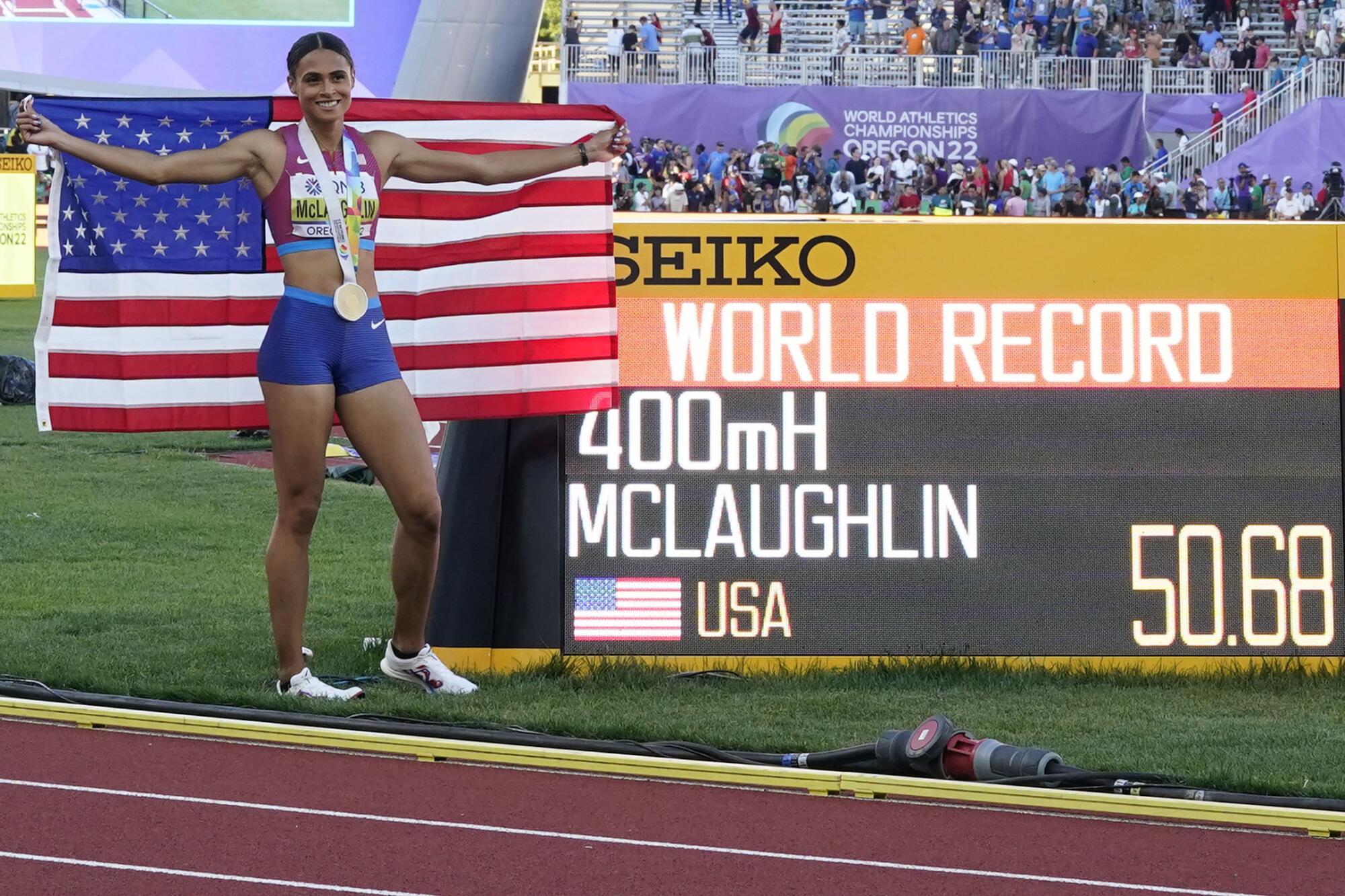
“I’ve gotten to a place where I’m more comfortable with myself and what I’ve accomplished and where I do want to speak on behalf of athletes and be able to draw people more into our sport and make it a wide-stream thing.”
— Sydney McLaughlin-Levrone, on bringing more attention to track and field
One key source of guidance is Joyner-Kersee. McLaughlin-Levrone respects that as the winner of six Olympic medals between 1984 and 1996 in two events, heptathlon and long jump, Joyner-Kersee “has lived a lot of the things I am now going through, she said. Joyner-Kersee respects the younger athlete’s curiosity for the sport.
McLaughlin-Levrone will ask about how Joyner-Kersee handled everything from the moments before a race to the months after a season. Joyner-Kersee will remind her not to allow outsiders’ expectations to take away her joy. And yes, she said, they have discussed contesting multiple events.
“Everyone is always saying what you can’t do that she has the ability to really change the mindset of what can be done,” Joyner-Kersee said. She added: “I couldn’t put a limit on what she could do or not do.”
If her potential range left Young “lost for words,” Sebastian Coe, the president of World Athletics, the sport’s global governing body, had two when describing her 50.68 time.
“Jaw dropping,” Coe said in July.
The 1984 Olympic gold medalist at 1,500 meters, Coe starred in an era when superlative track performances made him front-page news and a guest on late-night talk shows. Now he heads an organization trying to rebuild the sport’s fanbase in the U.S. and make it a top-five sport by the 2028 Los Angeles Olympics. As such, he noted McLaughlin-Levrone is the type of high-wattage star the sport’s leaders needed to introduce to more fans.
“She’s thoughtful,” Coe said. “We just need to make sure that everybody knows more about her.”
For 10 days American athletes shined at the world championships in Eugene, Ore., but early metrics show track and field lags in popularity in the U.S.
Said Young: “She has really been that answer for the sport it’s been missing for a long time. It’s kind of like Bo Jackson, you know? Bo did football, excelled in it. All right, Bo did baseball, excelled in it.”
Exposure comes in several forms. By the 2024 Paris Olympics, there will have been a global track championship held for four consecutive years, and that has led McLaughlin-Levrone and Kersee to be more selective about how often to race before and after each championship, she said. It’s one reason why she has not competed in the Diamond League, the most high-profile circuit in terms of television distribution, since 2019.
Knowing track needs more eyeballs, McLaughlin-Levrone said she wants to be “the best ambassador for the sport that I can be,” a sign she feels prepared to embrace the spotlight in ways that might have run counter to her instincts when she was younger and had yet to assert herself as a global champion.
“Having that title under my belt and being able to accomplish that goal, I think was my main focus,” she said. “I have been a little bit more reserved and quiet early on in my career. But I think I’ve gotten to a place where I’m more comfortable with myself and what I’ve accomplished and where I do want to speak on behalf of athletes and be able to draw people more into our sport and make it a widestream thing.”
To new fans who perhaps saw her for the first time when the clip of her latest world record played on “SportsCenter,” she wants them to know her outrageous track achievements belie an exceedingly normal life. That she enjoys makeup, fashion and working with children. Perhaps more than anything, and “regardless of where I end up on a podium, how many followers I gain or lose,” she wants to be known for an ardent faith.
She has even looked into how she might one day publish her poetry. The next six years will feature three world championships, two Olympics, the possibility of a new event and plenty of writing material.
More to Read
Go beyond the scoreboard
Get the latest on L.A.'s teams in the daily Sports Report newsletter.
You may occasionally receive promotional content from the Los Angeles Times.

